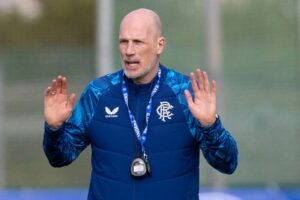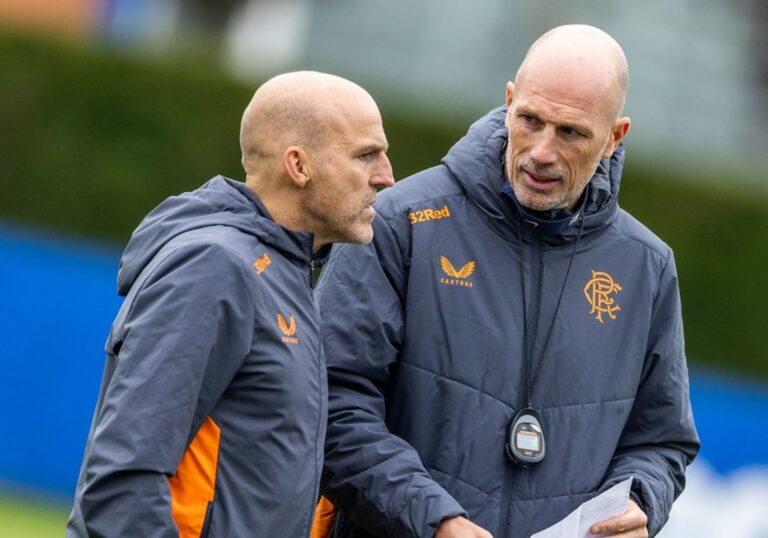
The story behind the Ibrox flop who paid to play for Rangers.
The way Glasgow Rangers have changed since the middle of October has been extraordinary.
After taking over for Michael Beale, Philippe Clement brought life to a club that was stagnating. Five months later, the Gers are competing for the Premiership title, have won the League Cup, and have advanced to the Europa League round, where they will play Benfica.
It’s has to be mentioned that the Belgian is off to a decent start, but there is still a lot of work ahead in the season, particularly because Celtic will not give up the league crown easily.
Even more amazing is how Clement managed to get the Ibrox team to this point after taking over from Beale with a roster that included players who had spent exorbitant amounts of money.
Due to a few injuries, Danilo has only played 21 times this season, Sam Lammers has already left for FC Utrecht on loan for the remainder of the campaign, and Cyriel Dessers is just now starting to show that he can be an important player of the team after a difficult start.
In 2023, the Light Blues paid €14.8 million (£12.6 million) for these three players, however they weren’t the first to sign for astronomical salaries and didn’t perform up to par.
Yes, it has been going on for a while. One of the most prominent instances is Michael Ball, who joined the team in 2001 and quickly became one of their record signings.
How much the Rangers spent on Michael Ball
Rangers had won five of the six domestic titles that were available to them in the 1998–1999 and 1999–2000 seasons under Dick Advocaat, leading the team back to the top of Scottish football.
When Martin O’Neill joined Celtic in 2000, the team was in dire straits, but he turned it around. In 2000–01, they achieved their own domestic triple crown, with Rangers trailing far behind.
The Dutchman understood he needed to add players before the next season to compete with the Parkhead team, so he made some big purchases. Shota Arveladze, Christian Nerlinger, and Claudio Caniggia were among the players who signed; nonetheless, Ball was the one who invested the most money.
After leaving Everton for the Gers in a transaction estimated to be worth £6.5 million, the left-back became the club’s second-highest player acquisition ever, and it appeared as though the left-back problem would be resolved going forward.
The Englishman, who was just 21 years old when he signed, had a bright future ahead of him provided he avoided injuries, but they would be his downfall after he committed to the Glasgow team more than 20 years ago.
The Rangers statistics for Michael Ball
Due to injuries, the defender didn’t actually make his Ibrox debut until October 2001. Advocaat informed the media as soon as he signed, saying:
“The player won’t play for six to eight weeks because we don’t want to take a gamble but in the longer term there is no risk at all.”
Ball appeared to have overspent for the former Everton youngster as he played just nine games in his first season in Scotland, scoring just once in a UEFA Cup match.
Expectations were high for the 2002–03 season since, in the last few months of the previous season, Alex McLeish had guided the team to a domestic cup double. However, Ball would have to endure even more suffering as he would miss the entire treble-winning campaign.
The left-back’s injury problems had prevented him from winning five trophies, but he recovered to play 40 times for Rangers in the 2003–04 season, demonstrating a keen willingness to make things happen. However, this was their worst season in a long time as they finished without a trophy for the first time in three years.
He eventually won a league title with the Gers over the course of the next two years with 18 appearances, but McLeish traded him to PSV Eindhoven at the close of the summer transfer window in 2005, ending his terrible time spent north of the border.
Why did Michael Ball pay to be a Rangers player?
A condition was added to Ball’s contract during the Gers’ transfer discussions with Everton, requiring the Ibrox team to pay the Toffees £500k every game after Ball made his 60th appearance for the team.
The club was unwilling to do this because of the severe financial position at the time, which may have resulted in the defender missing more time than was fair.
In order to get more playing time, Ball did ultimately agree to pay Sir David Murray a fee. He talked about this in an interview from 2010, saying:
“It was after an Ibrox game that I recall the gaffer, Alex McLeish, told me the chairman wanted to meet me; that’s when he presented the concept to me. When Alex inquired about the outcome, I was still somewhat taken aback by what had just transpired. In order for them to pay Everton, I had promised to pay £4,000 each time I played.
“I wasn’t positive that I had it correct. We laughed a little about it, and with a few minutes remaining in the day, I substituted in. I recall thinking, “I just wasted $4k on that.”
Had it not been for his injuries and the ongoing contract dispute, Ball could have been a mainstay of the team during a seven-trophie winning era.
But he only managed to win two before moving to PSV for £500,000 and winning the league title there. From 2006 to 2009, he played 63 times for Manchester City. In the end, he retired in 2011.
It is reasonable to say that Rangers had a shocker over Ball, even though he had promised it. After all, they had to pay £6.5 million to sign him, and this was in a time when money seemed to be no object.
Fortunately, the team has moved on from that incident, and supporters may anticipate that the Gers will add promising players without having to pay a premium under Clement.

Leave a Reply